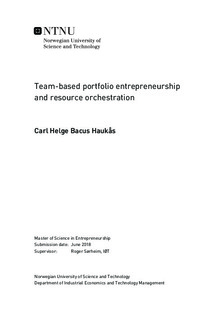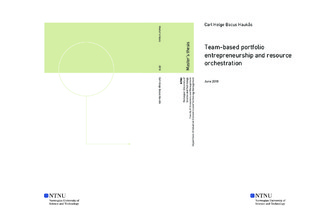| dc.description.abstract | Entrepreneurship involves exploring and exploiting business opportunities in environments filled with uncertainty. Whereas the firms resources are vital elements to sustainability, it is an inadequate observation for enduring entrepreneurship. The strategic entrepreneurship perspective highlights the managerial importance to reach strategic objectives, and some continuously rejuvenate their businesses through time and changing markets by exploring and exploiting opportunities. Portfolio entrepreneurship is a brilliant example, as it has been recognized as a viable model that continuously deal with the trade-off between exploration and exploitation. However, the theory is still far underdeveloped and lacks empirical data on managerial processes. This study expands our knowledge by examining team-based portfolio entrepreneurs who focus on early-stage startups, through the research questions; (1) What triggers resource orchestration across firms in the portfolio context?; (2) How do team-based portfolio entrepreneurs operate and differ from single portfolio entrepreneurs? What effects does this imply in the portfolio context?; (3) How is early-stage entrepreneurship conducted and what effects does this imply in the portfolio context with team-based entrepreneurs?
Through a single-case study, eight subprocesses are identified among the entrepreneurs at top managerial-level. First, centralizing and facilitating was found to be the vital elements to enable resource orchestration across firms. Second, the entrepreneurs engaged in collaboration, exchanging network, adapting roles, and reallocating capacity. By using collective strengths accordingly to startup needs, they enhance individual responsibilities at the operational level. Third, through actively incubating opportunities and decoupling startups at scaling stage they renew the portfolio, by being cautious in the process they assist further growth and enable a focus on early-stage startups. These subprocesses were grouped into the aggregated theoretical constructs of fostering conditions, sharing, harmonizing, and rejuvenating.
This contributes to portfolio entrepreneurship and resource orchestration by providing insights on enabling factors for resource orchestration across firms, and the managerial processes used for exploration, exploitation, and ultimately enduring entrepreneurship. Furthermore, findings illustrate that the optimal scope of a portfolio is not finite, and depends on the amount of responsibility and capacity. Entrepreneurs can obtain insights for strengthening team effects by studying the eight subprocesses. Lastly, this provides policymakers with new insights on the value from portfolio setups and contributes to the discussion if portfolio entrepreneurs whom co-founds could address the lack of commercialization skills better than business incubators. | |

